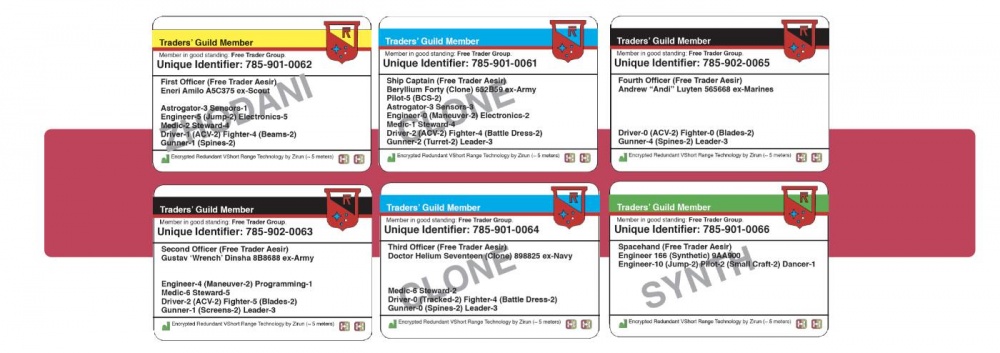Crew
Crew are the sophonts which operate a vehicle, smallcraft, bigcraft, NAFAL spacecraft, or FTL interstellar starcraft.
- Almost all crew are considered Spacers, part of a minority of the inhabitants of Charted Space who experience the dangers of space firsthand.
- Many are considered to possess the fabled Traveller Gene, a mark of guts and respect.
Description (Specifications)[edit]
Interstellar and intra-systemic vessels require crew for operations. Adventure Class Ships often have to double up crew members in key roles, while Battle Class Ships can frequently specialize crew members in ever more specialized roles. And some ships even maintain back-up crews as a Frozen Watch or two.
Image Repository[edit]
- A selection of crew cards of sophonts in port looking to join a ship.

Selected Crew Positions Common to Smaller Vessels[edit]
These are the most common roles for ACS vessels:
- Astrogator / Navigator
- Ship's Captain
- Corsair / Pirate
- Doctor / Medic
- Engineer
- Gunner / Weapon Operator
- Merchant Prince / Trader / Smuggler
- Pilot
- Prospector
- Scout
- Steward
Selected Crew Positions Common to Larger Vessels[edit]
These are the most common roles for BCS vessels, in addition to or replacing the above:
- Administrator
- Away Crew
- Boarding Party
- Cargo Master
- Command Specialist
- Communications Specialist
- Computer Specialist
- Corsair / Pirate
- Diplomat
- Emissary
- Engineering Specialist
- Freightmaster
- Guard
- Hull Specialist
- Loadmaster
- Master at Arms
- Marine
- Mechanic
- Mercenary
- Psion
- Scientist
- Security Specialist
- Sensor Operator
- Service Crew
- Soldier
- Trooper
- Zero-G Specialist
History & Background (Dossier)[edit]
Technology and culture are two of the biggest factors in determining crew sizes. Greater technology yields better capabilities for automation and artificial intelligence, which can greatly reduce crew size, and it is projected that such factors could one day eliminate crews altogether. Culture is another huge factor: Hivers are just fine with a maximal use of automation and artificial intelligence with claustrophillic crew accommodations while the K'kree are the opposite... they much prefer agoraphillic crew spaces and a maximal employment of live-bodied sophonts over machinery, computers, and automation.
Ship Crews of the Future[edit]
It is projected that by the TL:19-27 technological period, advanced minds with fully expressionistic artificial intelligence will be the norm and only a minimal crew will be required for ship operations. TL-15 technology is not yet up to these aspirations.
Vessels & Automation[edit]
Some races (sophont species) use more automation than others. Good automation can reduce the number of crew required on a ship. Other races prefer the relative reliability of warm-bodied crew-sophonts.
Vessels & Artificial Intelligence[edit]
As of the TL:13-15 technological epoch, a ship's computer with advanced artificial intelligence cannot entirely operate a ship. Crew are still required. Advanced AI Ship's Computers have been experimented with throughout Charted Space, and no silver bullet has yet been found. The main issue appears to be with jump drive operation.
Luxury vs. Efficiency[edit]
Different races (sophont species) have different preferences for creature comforts or different tolerances for spartan living or operating conditions. Many races have distinct, identifiable preferences for which is more important: Ship Operational Efficiency or Personal Crew-sophont Comfort.
Major Race Crewing Preferences[edit]
References & Contributors (Sources)[edit]
| This article is missing content for one or more detailed sections. Additional details are required to complete the article. You can help the Traveller Wiki by expanding it. |
- Marc Miller. Starships (Game Designers Workshop, 1977), —.
- Marc Miller, Frank Chadwick, John Harshman. High Guard (Game Designers Workshop, 1980), —.
- Marc Miller. Players' Manual (Game Designers Workshop, 1987), —.
- Martin Dougherty, Hunter Gordon. The Traveller's Handbook (QuikLink Interactive, 2002), —.
- Gareth Hanrahan, Dom Mooney. High Guard (Mongoose Publishing, 2008), —.
- Marc Miller. T5 Core Rules (Far Future Enterprises, 2013), —.
